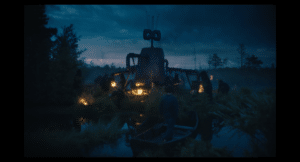Dir.: Beatrice Pollet; Cast: Maud Wyler, Geraldine Nakache, Gregoire Colin, Fanny Cottencon, Pascale Vignal, Pascal Demolon, Ophelia Kolb; France 2022, 95min.
Based on real events, French writer/director Beatrice Pollet recreates a courtroom drama centred on Claire Morel, a lawyer and mother of two daughters, whose denial of her pregnancy nearly led to the death of her newborn son and landed her in front of a court, accused of infanticide.
Claire (Wyler) is a happy mother of two and lives a contended middle-class life with husband Thomas (Colin), a tree surgeon. One night, when Thomas returns late home from work, he finds his wife bleeding heavily, her life hanging in the balance when the police arrive. But rather than help, they accuse her of infanticide after a neighbour found a new born baby in a dumpster opposite her house.
Claire’s best friend, a lawyer called Sophie (Nakache) takes over her case. But it’s not going to easy. Claire was in denial of her pregnancy, she the court and jury take a dim view of her, pressing a harsh sentence. The Judge (Demolon) takes a sympathetic view, the prosecutor (Kolb) asks for the maximal custodial sentence of seven years. Sophie researches Claire’s medical history. It seems she was only aware of being pregnant with her daughter Babou three months into the term. But nobody really believes Claire has “repressed” the birth of her baby son – and she cannot remember dumping him on the container. Even Thomas has his doubts. Yet Sophie remains convinced of her friend’s story. In the end, it falls to the medical experts. The public – and particularly women – aggressively calling Claire “a Sorceress” and asking “for the protection of the womb”.
There are echoes of Alice Diop’s recent Venice winner Saint Omer another example of filicide with no rational motive. Claire is in a much stronger position being a lawyer, and aware of how the system works. But she is reluctant to exercise her professional knowledge incase she loses her status as a lawyer. But more than anything, she fears her new baby, Simon, will never bond with her.
Pollet tries very hard to avoid any sentimentality, and she succeeds most of the time, although we don’t feel get a strong impression of the characters, they seem to fade into George Lechaptois washed out aesthetic. A worthwhile drama but one that could have certainly benefited from more more emotional cut and thrust and a less academic approach. AS


